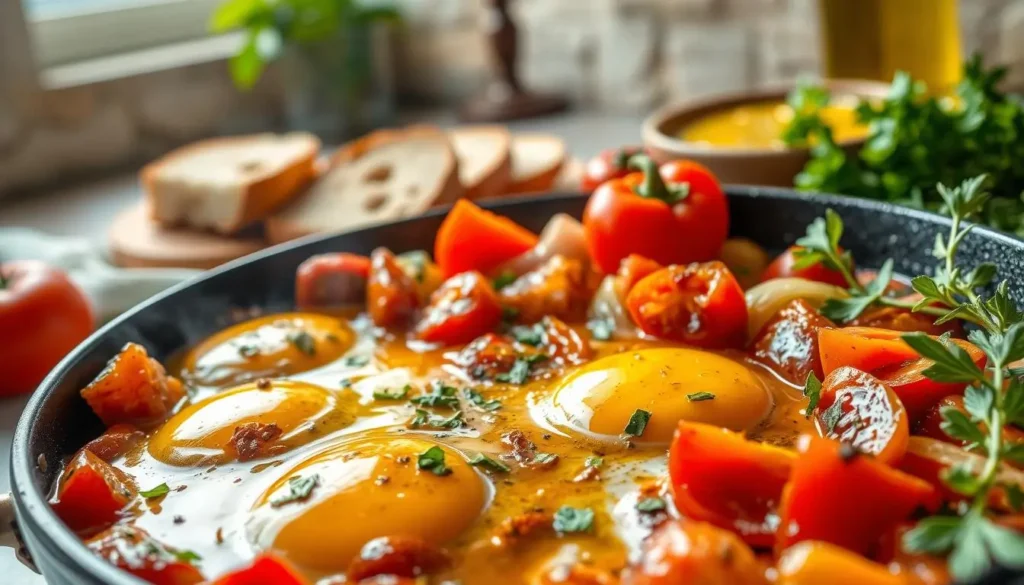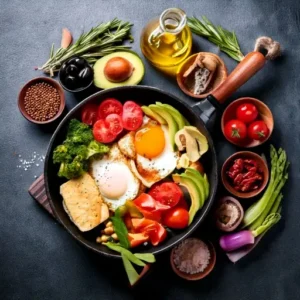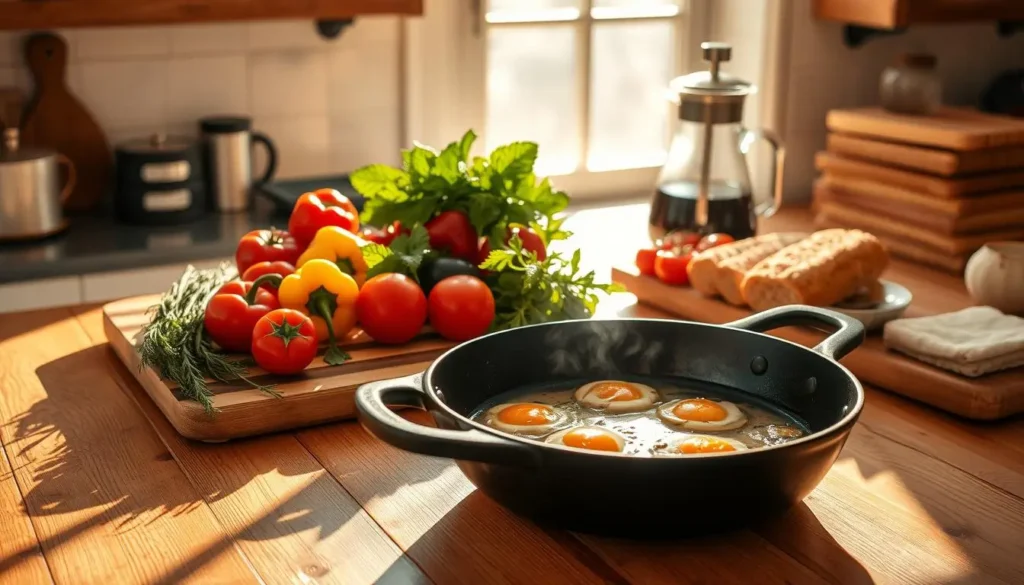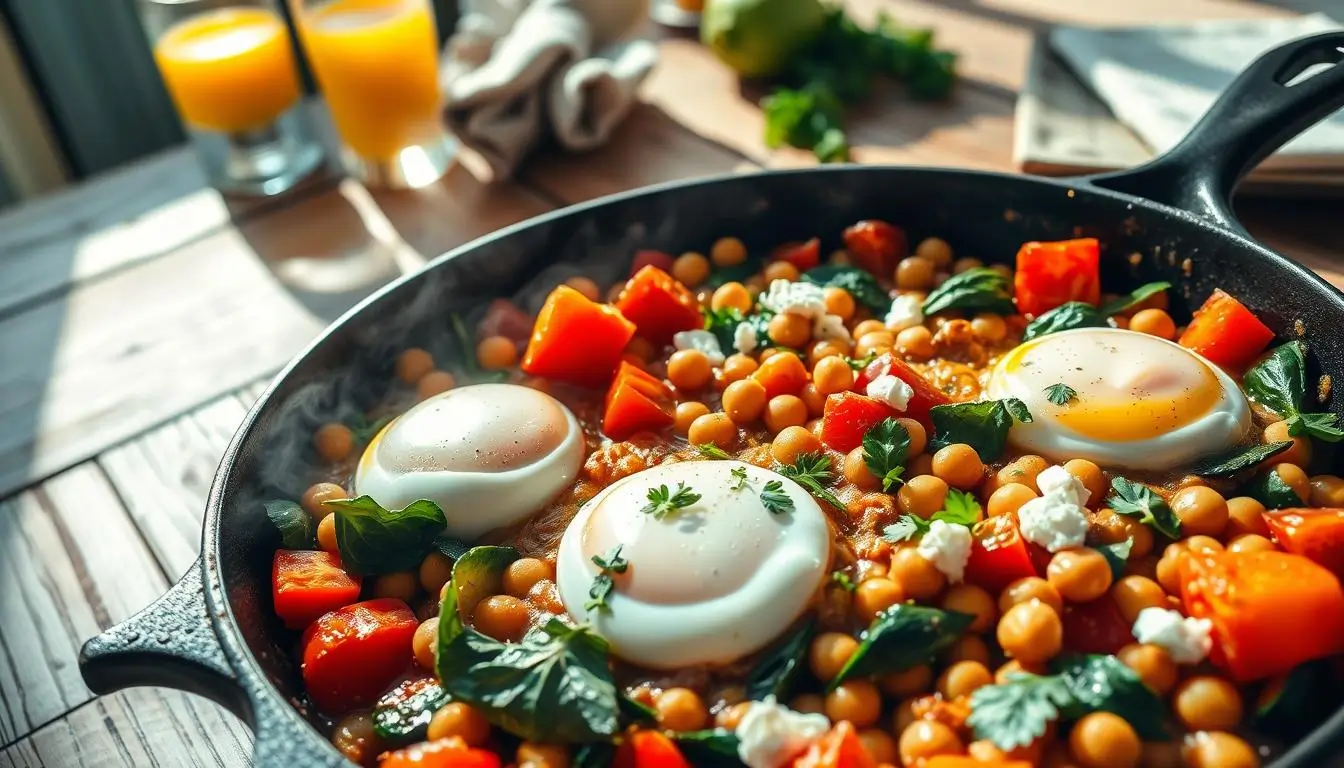Table of Contents
Every morning, I dream of a breakfast that feels like a sunny Mediterranean morning. The Mediterranean breakfast skillet with eggs is my go-to, bringing vibrant flavors and health to my table fast.
This easy Mediterranean breakfast skillet is more than just a meal. It’s a celebration of fresh ingredients, bold spices, and healthy traditions. With simple elements like potatoes, bell peppers, cherry tomatoes, and eggs, it energizes me and delights my senses.
The dish’s beauty is in its simplicity and flexibility. It’s perfect for families or a quick solo breakfast. The Mediterranean breakfast skillet meets your needs with amazing taste and health benefits.
Key Takeaways
- Quick and nutritious breakfast option
- Packed with fresh Mediterranean ingredients
- Adaptable to different dietary preferences
- Provides balanced nutrition in one skillet
- Offers a delicious alternative to traditional breakfast
The Art of Mediterranean Morning Cuisine
Mediterranean breakfast skillets are more than just breakfast. They celebrate culture, health, and connection. Exploring this cuisine opens a world where food is a joy.

The best mediterranean breakfast skillets capture the essence of morning meals in Greece, Spain, and Lebanon. They offer a mix of flavors and ingredients, making every bite special.
Understanding Breakfast Traditions Across Regions
Breakfast in Mediterranean countries is diverse but shares common themes:
- In Lebanon, breakfast might include bulgur with milk and honey
- Spanish mornings feature toasted bread and fresh cheese
- Greek tables showcase paximadia (traditional bread), olives, and cheese
- Moroccan breakfasts often include fried eggs in olive oil
Health Benefits of Mediterranean Morning Meals
A healthy mediterranean breakfast focuses on whole foods and balanced nutrition. The Oldways 1-2-3 breakfast plan suggests:
- Whole grains
- Fresh fruits or vegetables
- Protein sources like eggs or yogurt
Cultural Significance of Shared Breakfast Platters
Mediterranean breakfast is a social event. Families and friends gather, making mornings special. Each bite tells a story of tradition, community, and culinary heritage.
Essential Ingredients for Your Mediterranean Breakfast Skillet
To make a real Mediterranean breakfast, you need the right ingredients. They should be fresh and full of nutrients. My Mediterranean breakfast skillet has all these, helping you lose weight and get the nutrients you need.

Mediterranean Breakfast Skillet
Equipment
- Large non-stick or cast-iron skillet
- Cutting Board & Knife
- Measuring Spoons
- Spatula or Wooden Spoon
- Lid for skillet
Ingredients
- 1 tablespoon olive oil
- 1 small red onion diced
- 1 red bell pepper chopped
- 1 yellow bell pepper chopped
- 1 zucchini diced
- 1 cup cherry tomatoes halved
- 1 teaspoon garlic minced
- 1 teaspoon dried oregano
- ½ teaspoon paprika
- Salt and pepper to taste
- 4 large eggs
- ¼ cup crumbled feta cheese
- 2 tablespoons fresh parsley chopped
- Optional: olives spinach, or avocado slices
Instructions
Heat the skillet:
- In a large non-stick or cast-iron skillet, heat olive oil over medium heat.
Sauté vegetables:
- Add onion, bell peppers, zucchini, and garlic. Cook for 5-7 minutes, stirring occasionally until softened.
Season the veggies:
- Add oregano, paprika, salt, and pepper. Toss in cherry tomatoes and cook for another 2 minutes until tomatoes start to soften.
Create wells for eggs:
- Make 4 small wells in the veggie mixture and crack an egg into each one.
Cook the eggs:
- Cover the skillet with a lid and let cook for 4-6 minutes, or until the egg whites are set and yolks are to your desired doneness.
Garnish and serve:
- Sprinkle with feta cheese and parsley. Serve warm, optionally with crusty bread or pita.
Notes
- Calories: 290 kcal
- Protein: 13g
- Fat: 19g
- Carbohydrates: 17g
- Fiber: 4g
- Sugar: 6g
- Sodium: 410mg
The main ingredients for a great Mediterranean breakfast skillet are:
- Eggs: They are the main protein (15.8g protein per serving)
- Extra virgin olive oil (2 tablespoons for sautéing)
- Fresh vegetables:
- Cherry tomatoes (2 cups)
- Baby spinach (2 cups)
- White button mushrooms (8 ounces)
- Feta cheese (crumbled)
- Seasonings: Aleppo pepper and za’atar (1 teaspoon each)
These ingredients are great for a Mediterranean breakfast that helps with weight loss. Each serving has just 246.5 calories but is full of vitamins. You get lots of fiber (7g), potassium (700.5 mg), and important vitamins A and C.
It’s best to use fresh, top-quality ingredients for the best taste and health benefits. The Mediterranean diet focuses on whole, unprocessed foods. This makes the breakfast skillet a great choice for a healthy morning start.
Kitchen Tools and Equipment Requirements
Preparing a delicious Mediterranean breakfast skillet needs the right tools. I’ve found that the right equipment makes a big difference in making a great meal.
The key to making mediterranean breakfast potatoes is choosing the right skillet. The skillet you pick can change how your dish tastes and feels.
Selecting the Perfect Skillet
When picking a skillet for a Mediterranean breakfast, think about these things:
- Material: Cast iron keeps heat well
- Size: A 10-12 inch skillet is best for 2-4 people
- Surface: Nonstick or seasoned to prevent sticking
- Depth: At least 2 inches for all ingredients
Essential Kitchen Tools
You’ll also need these tools:
- Sharp chef’s knife for chopping veggies
- Wooden spatula for stirring
- Cutting board
- Measuring cups and spoons
| Tool | Purpose | Recommended Type |
|---|---|---|
| Skillet | Primary cooking vessel | Cast iron or nonstick |
| Knife | Vegetable preparation | Sharp chef’s knife |
| Spatula | Cooking and serving | Wooden or silicone |
Pro tip: Invest in quality tools that will last. Your mediterranean breakfast skillet deserves the best equipment!
Mediterranean Breakfast Skillet: Step-by-Step Preparation
Making a tasty Mediterranean egg dish for breakfast needs careful steps. A breakfast in a skillet, known as shakshuka, mixes fresh ingredients with cooking skills. This creates a fantastic morning meal.

- Ingredient Preparation
- Dice 1 small onion
- Chop 1 yellow bell pepper
- Cube 3 potatoes
- Halve 1 cup cherry tomatoes
- Initial Cooking Process
- Heat 2 tablespoons olive oil in skillet
- Sauté onions for 4-5 minutes
- Add potatoes, cook 15-20 minutes
- Sprinkle 1 teaspoon dried oregano
- Final Preparation
- Add cherry tomatoes
- Create small wells for eggs
- Crack 3 eggs into wells
- Cook eggs 5-7 minutes
- Top with ¾ cup crumbled feta
- Garnish with fresh dill
This Mediterranean breakfast skillet feeds 3 and takes about 40 minutes to make. Each serving has 343 calories. It’s a good mix of carbs, protein, and fat: 45g carbs, 11g protein, and 14g fat.
Mastering the Perfect Egg Technique
Eggs are key in many Mediterranean breakfasts, like shakshuka. Learning how to cook eggs can make your breakfast skillet amazing.
For shakshuka on the Mediterranean diet, cooking eggs right is important. I’ll share my top tips for perfect eggs every time.
Exploring Egg Cooking Methods
The Egg-Doneness Scale shows different ways to cook eggs:
- Sunny-Side Up: Cooked 2-3 minutes with a runny yolk
- Over-Easy: Flipped with a soft, runny center
- Over-Medium: Partially set yolk after 35 seconds of cooking
- Over-Hard: Fully cooked yolk, taking 1-2 minutes
Achieving the Ideal Yolk Consistency
For a true Mediterranean breakfast, try these techniques:
- Use medium-low heat for consistent cooking
- Choose a non-stick skillet for easier preparation
- Select fresh eggs at room temperature
- Experiment with different cooking fats like olive oil or butter
Pro tip: Extra-virgin olive oil prevents sticking and adds a Mediterranean flavor to your eggs.
Creative Vegetable Combinations and Seasonings
Exploring if eggs are okay on the Mediterranean diet, I found that veggies are key. The right mix of vegetables turns a simple egg dish into a vibrant, flavorful meal. This aligns perfectly with Mediterranean dietary principles.
Here are my top picks for vegetable combinations that make eggs amazing in a Mediterranean-style skillet:
- Classic Mediterranean Blend:
- Ripe cherry tomatoes
- Diced bell peppers
- Sliced red onions
- Fresh spinach leaves
- Seasonal Vegetable Mix:
- Zucchini ribbons
- Roasted eggplant cubes
- Artichoke hearts
- Fresh herbs like dill and oregano
For those wondering if eggs are okay on the Mediterranean diet, I say yes. They pair well with these veggie combinations. The secret is using fresh, quality produce and seasoning them well.
| Vegetable | Roasting Temp | Roasting Time | Nutritional Highlights |
|---|---|---|---|
| Bell Peppers | 425°F | 15-20 minutes | High in Vitamin C |
| Zucchini | 400°F | 15-20 minutes | Low calorie, high water content |
| Spinach | N/A (Sautéed) | 2-3 minutes | Rich in Iron and Folate |
My go-to seasoning blend is za’atar. It’s a traditional Mediterranean spice mix that adds incredible depth to eggs and veggies. Sprinkle it generously for a true taste of the region’s culinary traditions.
Cheese and Herb Pairings for Enhanced Flavor
Making a memorable mediterranean breakfast skillet is all about the right cheese and herbs. These ingredients can turn a simple dish into a masterpiece. I’ve found that the right choices can make a big difference.
Mediterranean Cheese Varieties
For your breakfast skillet, try these cheeses:
- Feta: A classic Mediterranean cheese with a tangy, salty flavor
- Halloumi: A firm cheese that grills beautifully without melting
- Goat cheese: Creamy and mild, perfect for adding richness
- Ricotta: Light and smooth, great for a softer texture
Herb Pairing Recommendations
Fresh and dried herbs can really boost your breakfast skillet’s taste. Here are some top pairings:
- Basil: Pairs wonderfully with feta and mozzarella
- Dill: Complements goat cheese and adds a bright note
- Oregano: Excellent with halloumi and provides an earthy taste
- Thyme: Works beautifully with ricotta and adds depth
Pro tip: Fresh herbs are more flavorful than dried ones. Chop them just before adding to keep the flavor and aroma strong.
Make-Ahead Tips and Storage Guidelines
Creating delicious mediterranean breakfast skillet recipes requires smart preparation strategies. I’ll share my top make-ahead techniques to help you enjoy a stress-free morning meal without compromising taste or quality.
When preparing the best mediterranean breakfast skillet, strategic meal planning can save significant time. Here are my recommended make-ahead approaches:
- Ingredient Prep: Chop vegetables like bell peppers, onions, and zucchini up to 3 days in advance
- Store prepped vegetables in airtight containers in the refrigerator
- Cook grains such as quinoa in bulk – prepare 6 cups instead of 2 for future meals
- Freeze cooked grains in 2-4 cup portions for easy access
For optimal freshness and flavor, follow these storage guidelines:
- Refrigerate assembled skillet for up to 3 days
- Freeze unbaked casserole for up to 3 months
- Thaw frozen casserole overnight in the refrigerator
- Add 1.5 hours of additional baking time when cooking from frozen
Reheating tips can help maintain the skillet’s delicious texture. Microwave at 50% power for about 45-60 seconds, or reheat in a skillet over medium heat to preserve the crispy edges.
By implementing these make-ahead strategies, you’ll streamline your morning routine while enjoying a nutritious, flavorful mediterranean breakfast skillet that feels freshly prepared.
Conclusion: Embracing the Mediterranean Breakfast Experience
My journey to make the perfect mediterranean breakfast skillet has shown me more than just a tasty dish. It’s a way of life that focuses on health and tradition. The skillet is a mix of fresh ingredients, careful preparation, and a love for cooking.
This breakfast is packed with health benefits. Studies say it can lower heart disease risk by 30%, boost brain function, and improve overall health. By using whole grains, veggies, and olive oil, you’re not just eating. You’re taking care of your health for the long run.
Think of this breakfast as more than a recipe. It’s a chance to enjoy each bite slowly and connect with a long-standing cooking tradition. The mediterranean breakfast skillet is not just food. It’s a tasty way to live a healthier, more vibrant life that feeds both your body and soul.
Begin your day with this nutritious skillet. You’ll find a world of taste, health, and happiness that changes how you see breakfast. Your taste buds and body will be grateful for this Mediterranean morning meal approach.

